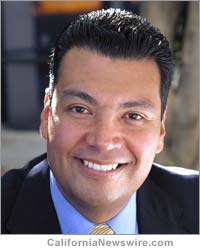 SACRAMENTO, Calif. /California Newswire/ — On October 1, California is slated to be one of the first states in the nation to provide voter registration through a Health Benefit Exchange to residents who are otherwise eligible to vote and have not registered. Last year, Governor Brown signed into law Senate Bill 35, authored by Senator Alex Padilla (D-Pacoima). SB 35 expands voter registration opportunities by requiring that California come into full compliance with the National Voter Registration Act of 1993 (NVRA), commonly known as Motor Voter. In the language of the new law, Senator Padilla included the California Health Benefit Exchange as one of the many “Motor Voter” agencies.
SACRAMENTO, Calif. /California Newswire/ — On October 1, California is slated to be one of the first states in the nation to provide voter registration through a Health Benefit Exchange to residents who are otherwise eligible to vote and have not registered. Last year, Governor Brown signed into law Senate Bill 35, authored by Senator Alex Padilla (D-Pacoima). SB 35 expands voter registration opportunities by requiring that California come into full compliance with the National Voter Registration Act of 1993 (NVRA), commonly known as Motor Voter. In the language of the new law, Senator Padilla included the California Health Benefit Exchange as one of the many “Motor Voter” agencies.
As part of California’s implementation of the Affordable Care Act (ACA), health insurance coverage for individuals and small businesses will become available beginning on October 1, 2013 through the California Health Benefit Exchange, known as Covered California. When people sign up for health care they will have an opportunity to register to vote as well.
“With the historic launch of Covered California, not only will millions of Californians have access to healthcare coverage for the first time, those who are otherwise eligible to vote and have not registered, will also have the opportunity to register to vote,” said Senator Alex Padilla.
“Voter registration and participation strengthens our democracy. Nearly 5.8 million Californians who are otherwise eligible to vote are not currently registered,” said Padilla. “Covered California provides a unique opportunity to reduce the number of unregistered Californians and increase participation,” Padilla said.
The new law requires the California Health Benefit Exchange to provide voter registration online to its clients. In addition, it requires hundreds of state offices in all 58 counties to fully implement Motor Voter.
Specifically:
• Requires the Secretary of State to adopt regulations to fully implement Motor Voter;
• Requires county elections’ officials to train county Motor Voter agencies;
• Requires each agency to ensure that each employee of the agency who may provide voter registration services, is trained every year;
• Requires a county agency to designate an employee to be responsible for voter registration, and
• Requires the Secretary of State to review state agencies’ compliance.
State agencies that must comply with the new law include:
• California Health Benefit Exchange
• Department of Motor Vehicles (DMV)
• Armed Forces Recruitment Offices
• Independent Living Centers
• CalWORKs
• CalFresh Program
• Medi-Cal Program
• California WIC Agencies
• In-Home Supportive Services Program
• Department of Rehabilitation: Vocational Rehabilitation Services
• Department of Developmental Services: Regional Centers
• Department of Social Services: Office of Deaf Access
• Mental Health Providers
• Franchise Tax Board
• Board of Equalization
A random field investigation conducted in 2009 of 29 California public assistance agencies in six counties, found only one that provided voter registration applications and services to clients. Motor Voter requires that social service agencies provide their clients with a mail-in voter registration application when applying for benefits, renewing/recertifying benefits, and reporting a change of address. The agencies are also required to assist the client in filling out the voter registration application and submit the completed application for the client.
Because of the lack of compliance with Motor Voter, voter registration at public assistance agencies steadily declined from a peak of 158,168 registrations in 1996 to 30,726 in 2011. This, despite rising levels of people seeking services at public assistance agencies. Other states that have sought to fully implement Motor Voter have seen increases in voter registration. Ohio and Missouri both increased their compliance with Motor Voter in 2009 and saw increases in registrations of 480% and 677% respectively.
Senator Alex Padilla, 40, graduated from MIT with a degree in Mechanical Engineering. He currently serves on the Board of MIT and is President of the National Association of Latino Elected and Appointed Officials. He is Chair of the Senate Energy, Utilities and Communications Committee and represents the more than 1,100,000 residents of the 20th State Senate District in Los Angeles.














